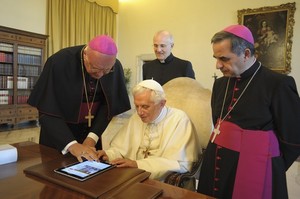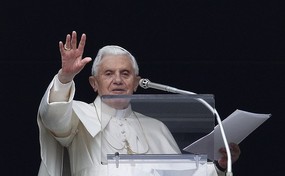Tag: social network
Benedict XVI to tweet… join in
You heard yesterday that Pope Benedict XVI is now tweeting. Terrific!
The Papal Twitter account is up and running: @Pontifex
As of right now, the English page has 381K followers, the German has 9.5K, the Spanish 88K, the Italian has 36K, the French has 7k and the Arabic has 3,000.
The Press Office of the Holy See said the following about the Papal presence in the digital media.
The The Pope’s presence on Twitter
is a concrete expression of his conviction that the Church must be present in
the digital arena. This initiative is best understood in the context of his
reflections on the importance of the cultural space that has been brought into
being by the new technologies. In his Message for World Communications Day
2009, which was published on the same day as the Vatican’s Youtube channel was
opened, Pope Benedict spoke of the necessity of evangelizing the ‘digital
continent’ and he invited young believers, in particular, to introduce
into the culture of this new environment of communications and information
technology the values on which you have built your lives.
“Silence and Word: Path of Evangelization” explained
Earlier today, Monsignor Paul Tighe, the Secretary to the Pontifical Council for Social Communications, talked about the Pope’s 2012 message for World Communications Day (May 20, 2012).
Benedict XVI launches News.va with his new iPad
 Today, Pope Benedict launched a new Vatican website with a new iPad.
Today, Pope Benedict launched a new Vatican website with a new iPad.
Is social media rebooting religion?
 The past week the news has been consumed by the Anthony Weiner fiasco. His mis-use of Twitter is obviously very regrettable and it ought to cause each of us on Net to pause and ask ourselves: Are we doing good –are we responsible– by having a digital presence? What can be learned from Weiner (his own political fate has yet to be decided)? One lesson to learn: don’t let virtual replace the dignity of the personal relationship. The the thrill Weiner may have had for a second has vanished all-too-quickly to be real.
The past week the news has been consumed by the Anthony Weiner fiasco. His mis-use of Twitter is obviously very regrettable and it ought to cause each of us on Net to pause and ask ourselves: Are we doing good –are we responsible– by having a digital presence? What can be learned from Weiner (his own political fate has yet to be decided)? One lesson to learn: don’t let virtual replace the dignity of the personal relationship. The the thrill Weiner may have had for a second has vanished all-too-quickly to be real.
Claudio Celli advicates for greater use of social media
Archbishop Claudio Maria Celli, president of the Pontifical Council for Social Communications, has urged Catholics to evangelize the “digital culture.” He made his remarks on March 18. A common theme spoken of in recent weeks from various Vatican officials, including Pope Benedict. Celli’s office has been working overtime in recent weeks in tackling media in its various forms. And one must remember that it has taken aliong time to get where we are today, thanks in part to the good work of many laity, lower clergy and a Franciscan Sister of the Eucahrist Sister Judith Zoebelein. The Vatican has been on the web since 1995.
Archbishop Celle told L’Osservatore Romano in a March 17 interview that after Easter, the Holy See will launch a new news website that will gather all the Vatican media services into one portal in English, French and Italian with the hope to offer its media services in additional languages.
Continue reading Claudio Celli advicates for greater use of social media
Church’s use of the Net too often answers questions not asked
Kyle Logue’s essay on Christian Web Trends, “4 Reasons Why Church Websites Don’t Attract Visitors“. Kyle pinpoints a number of good things to keep in mind for the work sharing the faith with the outside world. Pay attention! His list includes:
- lack of interaction
- no easy way to share content
- lack of good content
- lack of purpose.
Pope Benedict on social communications: be truthful and authentic in relationships with God, self & others
Here’s Pope Benedict’s letter for the World Day of Social Communications. There many great things in the document to ponder for our own personal development in the face of Truth, gospel and our brothers and sisters.
On the occasion
of the 45th World Day of Social Communications, I would like to share some
reflections that are motivated by a phenomenon characteristic of our age: the
emergence of the internet as a network for communication. It is an ever more
commonly held opinion that, just as the Industrial Revolution in its day
brought about a profound transformation in society by the modifications it
introduced into the cycles of production and the lives of workers, so today the
radical changes taking place in communications are guiding significant cultural
and social developments. The new technologies are not only changing the way we
communicate, but communication itself, so much so that it could be said that we
are living through a period of vast cultural transformation. This means of
spreading information and knowledge is giving birth to a new way of learning
and thinking, with unprecedented opportunities for establishing relationships
and building fellowship.


